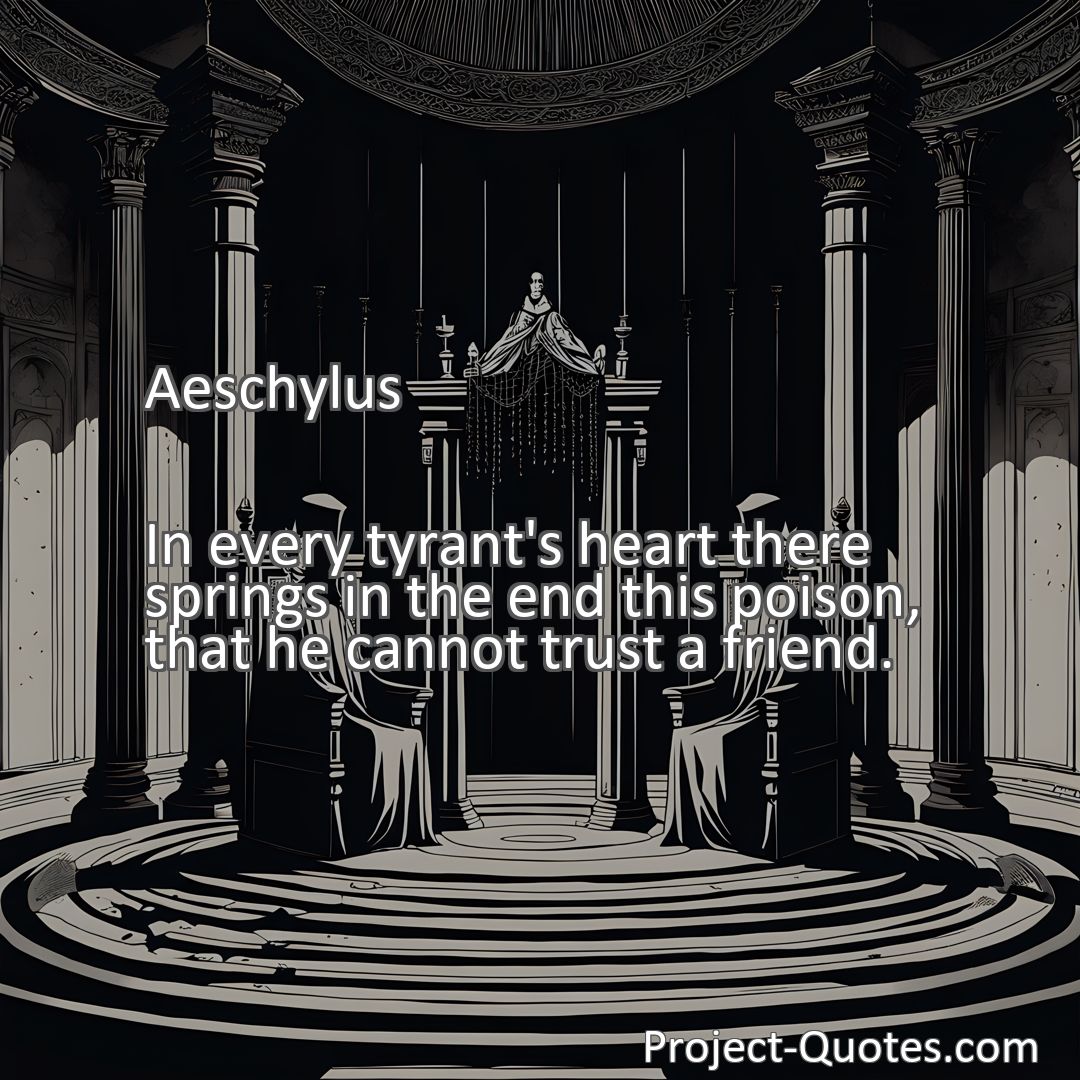In every tyrant’s heart there springs in the end this poison, that he cannot trust a friend.
Aeschylus
Why Anyone Would Genuinely Befriend a Tyrant: Understanding the Corrosive Effects of Mistrust Have you ever wondered why someone would willingly befriend a tyrant? This thought-provoking exploration delves into the corrosive effects of mistrust, highlighting the fear and paranoia that plagues the hearts of tyrants and prevents them from trusting even their closest companions. It serves as a cautionary tale, reminding us of the importance of trust in all our relationships and the tragic consequences that arise when it is compromised.
Table of Contents
Meaning of Quote – In every tyrant’s heart there springs in the end this poison, that he cannot trust a friend.
In the wise words of Aeschylus, an ancient Greek playwright and one of the earliest tragedians, we find a profound observation about the nature of tyrants. He asserts that within every tyrant’s heart, a poison grows that ultimately prevents them from placing trust in others, specifically their friends. This insightful quote speaks volumes about the corrupting power and loneliness that often accompanies tyrannical rule.
Now, envision a tyrant ruling with an iron fist, someone who wields their power unjustly, oppresses their subjects, and shows no regard for their well-being. Such a ruler, driven by their lust for dominance and control, is unable to trust those around them, even their closest companions. The poison referred to in the quote symbolizes the inherent fear that haunts a tyrant’s heart, leading them to constantly question the loyalty and motives of their associates.
As we dig deeper into this idea, it becomes clear that a tyrant’s inability to trust stems from multiple factors. Firstly, the very nature of their rise to power often involves acts of treachery and betrayal. To maintain their position, a tyrant must remain vigilant and suspicious of those who may seek to overthrow them. Consequently, this constant fear and paranoia foster an environment where trust becomes nearly impossible.
Furthermore, the actions of a tyrant mold their perception of friendship. They are driven by a desire for power and control, which often leads them to manipulate and exploit others for their own gain. Hence, they find it difficult to believe that anyone would genuinely befriend them without ulterior motives. The concept of a true and selfless friendship becomes foreign to them, and they begin to see every act of kindness as a calculated play for power or advantage.
In addition, a tyrant’s excessive focus on self-preservation greatly affects their ability to trust. They are constantly preoccupied with the preservation of their rule, leading them to view everyone around them with suspicion. Consequently, they believe that their friends might turn against them at any moment, driven by their own aspirations to claim the tyrant’s position of power.
The poison described by Aeschylus serves not only as a metaphor but also as a warning. A tyrant’s inability to trust not only alienates them but also perpetuates a vicious cycle of cruelty and isolation. As they become increasingly isolated, their actions grow more tyrannical, further solidifying the mistrust that defines their reign.
Moreover, Aeschylus’ insight reminds us that a tyrant’s fear of betrayal is not baseless. History is replete with examples of friends turning against their tyrant rulers. Countless revolutionaries and rebels have risen against oppressive regimes, often with the aid of those who were once considered loyal friends. These instances only further reinforce the tyrant’s paranoia and deepen the divide between them and their companions.
In light of this observation, the poison in a tyrant’s heart can be seen not only as a consequence of their actions but also as a contributing factor to their downfall. Their lack of trust drives them further away from the people around them, leaving them vulnerable to revolt. This vicious cycle, fueled by fear and mistrust, ultimately leads to the demise of many tyrants throughout history.
It is crucial to recognize that the poison of mistrust is not exclusive to tyrants alone. While the quote focuses on tyrants, its implications extend beyond the realm of oppressive rulers. It serves as a reminder to all of us about the importance of trust in our relationships with others, whether it be among friends, family, or colleagues.
Trust is the cornerstone of any healthy relationship. It allows us to rely on others and fosters a sense of security and belonging. Without trust, relationships crumble under the weight of suspicion and doubt. Aeschylus’s quote serves as a cautionary tale, encouraging us to nurture trust in our friendships. It reminds us that without trust, the very essence of friendship is compromised.
Moreover, the quote reminds us of the inherent vulnerability we all have as human beings. We are all susceptible to moments of mistrust, moments when we question the intentions and integrity of those around us. However, it is important to recognize that giving in to this mistrust can isolate us and prevent us from experiencing the joys of true friendship.
In conclusion, Aeschylus’s quote about the poison that grows in a tyrant’s heart, causing them to be unable to trust a friend, encapsulates the tragic consequences of tyranny and the corrosive effects of mistrust. It serves as a powerful reminder of the importance of trust, not only in the context of oppressive rulers but in all our relationships. May we all strive to foster trust and cultivate genuine friendships, breaking free from the poison that grips the hearts of tyrants.
I hope this quote inspired image brings you hope and peace. Share it with someone who needs it today!


